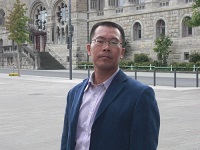by Tienchi Martin-Liao / October 23, 2013
On the contrasting lives of Chinese dissidents in prison.
Human rights activist and lawyer Teng Biao. Photo: Courtesy of Tienchi Marin-Liao.
Liu Xiaobo, 2010′s Nobel Peace Prize winner, is the only imprisoned laureate in Nobel Prize history. If no amnesty for Liu is prematurely granted, he will serve his sentence until 2020. Despite his odyssey as a dissident over the last two decades, in his famous final statement to the court, Liu said “…to underscore something that was in my June 2nd Hunger-strike Declaration twenty years ago: I have no enemies, and no hatred…I have been held at two different locations and have dealt with four pretrial police interrogators, three prosecutors, and two judges, and all of them have been reasonable and moderate in manner. They have often shown goodwill.” Liu also said that he has observed progress in prison management.
These words created much animosity among international intellectual circles. A handful of people have even attacked Liu for his capitulation to the communist regime, palliation of the cruel prison system, and betrayal of the democratic movement. One of them, the Stockholm-based writer and critic Chen Maiping, even submitted a letter of complaint to the Nobel committee, requesting they withdraw Liu’s prize.
This kind of behavior, when not conducted out of jealousy, is certainly a misinterpretation of Liu’s “no enemies, no hatred” philosophy. Not to mention, Liu Xiaobo is a famous personality; even normal political prisoners are generally more respected in Chinese prisons. While neither the authority nor the inmates acknowledge that these people did not commit crimes, it is understood that they speak their thoughts for the peoples profit, not their own. In Liu Xiaobo’s letter to Liao Yiwu on Jan. 13th, 2000, he said:
“Compared with your years in prison, my three prison stints were pretty mild. During the first, at Qincheng, I had my own cell, and my living conditions were better than what you had to endure. Sometimes I was deathly bored, but that’s about it. In my second stint – eights months inside a large courtyard at the base of the Fragrant Hills outside Beijing – I got even better treatment. There, except for my freedom, I had just about everything. During the third – three years at the reeducation-through-labor camp at Dalian – I was again singled out for special handling. My three elite-prisoner experiences can’t compare in any way to your suffering; I probably shouldn’t even say mine were imprisonments, compared to yours.”

